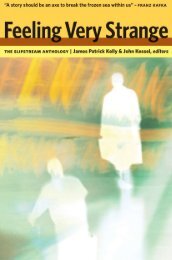The Curse of the Wer.. - Site de Thomas - Free
The Curse of the Wer.. - Site de Thomas - Free
The Curse of the Wer.. - Site de Thomas - Free
Create successful ePaper yourself
Turn your PDF publications into a flip-book with our unique Google optimized e-Paper software.
THE CALL OF THE WILD<br />
martial contexts, emphasizing qualities such as muscularity, physical<br />
endurance and bro<strong>the</strong>rly camara<strong>de</strong>rie. As Rotundo has argued, even<br />
men’s ‘animal nature’ was re-evaluated towards <strong>the</strong> turn <strong>of</strong> <strong>the</strong> century<br />
as ‘just as useful — and just as necessary to <strong>the</strong>ir manhood — as<br />
reason’. 35 In<strong>de</strong>ed, in <strong>the</strong> context <strong>of</strong> fin <strong>de</strong> siècle pessimism about <strong>the</strong><br />
Enlightenment project, <strong>the</strong> animal state was even to be preferred; as<br />
<strong>the</strong> werewolf in Mary Ca<strong>the</strong>rwood’s short story <strong>of</strong> 1893, for example,<br />
mused: ‘And what must a loup-garou do with himself? … I should take<br />
to <strong>the</strong> woods, and sit and lick my chaps, and bless my hi<strong>de</strong> that I was<br />
for <strong>the</strong> time no longer a man.’ 36<br />
Gilles Deleuze and Félix Guattari have <strong>the</strong>orized this impulse in<br />
relation to Freud’s case <strong>of</strong> <strong>the</strong> Wolf-Man. Along similar lines to Ginzburg,<br />
<strong>the</strong>y pick up on <strong>the</strong> powerful mythic resonances within <strong>the</strong> case<br />
that Freud failed to explore, proposing that ‘Freud obviously knows<br />
nothing about <strong>the</strong> fascination exerted by wolves and <strong>the</strong> meaning <strong>of</strong><br />
<strong>the</strong>ir silent call, <strong>the</strong> call to become-wolf.’ 37 Here, <strong>the</strong> ‘call to becomewolf’<br />
emerges as <strong>the</strong> opposite <strong>of</strong> <strong>the</strong> need to repress <strong>the</strong> ‘beast within’<br />
that <strong>the</strong> case <strong>of</strong> <strong>the</strong> Wolf-Man was so instrumental in popularizing. <strong>The</strong><br />
‘monstrous’ connection with <strong>the</strong> wolf that has animated <strong>the</strong>orizations<br />
<strong>of</strong> subjectivity is thus shown to pull <strong>the</strong> Self — and particularly <strong>the</strong><br />
masculine Self — in competing directions.<br />
Soon after <strong>the</strong> turn <strong>of</strong> <strong>the</strong> century, a pair <strong>of</strong> novels by Jack London<br />
inscribed <strong>the</strong>se competing constructions <strong>of</strong> <strong>the</strong> masculine psyche.<br />
An a<strong>de</strong>pt weaver <strong>of</strong> American myths about masculinity, even <strong>the</strong><br />
name <strong>of</strong> this writer compresses differing expressions <strong>of</strong> manhood:<br />
‘Jack’, <strong>the</strong> rugged, plain-talking frontiersman, and ‘London’, a city,<br />
a seat <strong>of</strong> hegemonic patriarchal civilization. Significantly, London<br />
was known as ‘Wolf’ among his friends, an apt summation <strong>of</strong> <strong>the</strong><br />
tense arbitration between nature and culture encapsulated by his<br />
public name. As Jonathon Auerbach notes, London’s Call <strong>of</strong> <strong>the</strong> Wild<br />
(1903), in which a domestic dog becomes <strong>the</strong> lea<strong>de</strong>r <strong>of</strong> a wolf-pack,<br />
and White Fang (1906), in which a wolf is domesticated, complement<br />
each o<strong>the</strong>r, <strong>of</strong>fering different perspectives on <strong>the</strong> same <strong>the</strong>me. 38 Both<br />
stories are analogies <strong>of</strong> human (and particularly male) nature; as John<br />
Sisk argues, Buck in Call <strong>of</strong> <strong>the</strong> Wild is no mere dog — ‘he is, in fact,<br />
105





